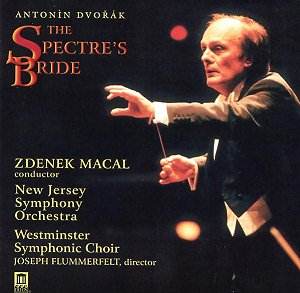|
|
Search MusicWeb Here |
|
 |
||
|
Founder:
Len Mullenger (1942-2025) Editor
in Chief:John Quinn
|
|
|
Search MusicWeb Here |
|
 |
||
|
Founder:
Len Mullenger (1942-2025) Editor
in Chief:John Quinn
|

|
Antonín DVOŘÁK (1841-1904)
|
| CD available for post-free online mail-order or you may download individual tracks. For some labels you can download the entire CD with a single click and make HUGE savings. The price you see is the price you pay! The full booklet notes are available on-line. |  |
|
NOTE • Click on the button and you can buy the disc or read the booklet details • You can also access each track which you may then sample or down load. • Further Information. |
|
|
These days there are occasional limited forays into performances of the choral works of Dvořák, the Stabat Mater and Te Deum heading a list which then may go on to include the Mass in D and the Requiem. On the other hand St Ludmila and The Spectre’s Bride are rarely done, probably because the choice lies between singing either in the inaccessible Czech original setting or using unacceptably outdated Victorian English translations by the likes of Ebenezer Prout, Mrs Natalie Macfarren or the Reverend John Troutbeck, hardly names which inspire enthusiasm. A pity, for Dvořák had a particularly successful relationship with England, whose people took his music to their hearts at once in the 1880s, with the Birmingham Triennial Festival in the vanguard of those organisations willingly prepared to undertake the commissioning of his works (his English publisher Novello was another). The Spectre’s Bride was just such a work, and the prim Troutbeck got in quickly with his own version of the title, which should be The Bride’s Nightgown. It comes from A Garland of Folk Tales, traditional tales put into verse by Karel (sometimes rendered as ‘Karl’) Jaromir Erben and which proved a rich seam for inspiring Dvorak’s orchestral tone poems. He had a choir of five hundred at Birmingham on 27 August 1885 and gave a triumphant performance, and it soon caught on elsewhere, including America in November of the same year and Melbourne, Australia the following year. This tale of a girl carried off by her phantom lover is in three scenes, the maiden in her chamber and the appearance of the ghost, the wild excursion across a haunted countryside, and their arrival at a cemetery. Soprano and tenor are assigned the principal roles, while the baritone and chorus narrate the tale between them at various points.
There are highs and lows in this performance. The accolades go unquestionably to three of the protagonists, the authoritative conducting of Zdeňek Mácal, the way his excellent orchestra responds (wonderfully sublime clarinet playing on track 19 at 3’ 20”), and to the fine Westminster Choir, whose confident Czech diction and full, impeccable ensemble and confident sound (track 13, 3’ 53") provide immense pleasure. Regrettably the soloists leave more to be desired. Oksana Krovytska looks young and beautiful but the voice sounds quite the opposite in places with its worrying beat, wide vibrato and strained quality, though her final aria (all of track 18) redeems her performance. The men fare better but with another East European as a major protagonist (Ivan Kusnjer), one wonders why the token American (John Aler) had to be included. It’s misfit casting unfortunately, but, with such fine playing and choral singing, worth putting up with.
Christopher Fifield
|
Alas! Where is my father gone? There on a plain open and wide At one go he leapt over the fence And
lo, at this moment Get a free QuickTime download here |
|
ADDITIONAL INFORMATION •
You can sample only 30 seconds (or 15% if that is longer) of a given track. Select from the View tracks list. Each sample will normally start from the beginning but you can drag the slider to any position before pressing play. • PLEASE NOTE: If you are behind a firewall and the sound is prematurely terminated you may need to register Ludwig as a trusted source with your firewall software.
•You will need Quicktime to hear sound samples. Get a free Quicktime download here • If you cannot see the "Sample All Tracks" button you need to download Flash from here.
|
|
|
Return to Index |